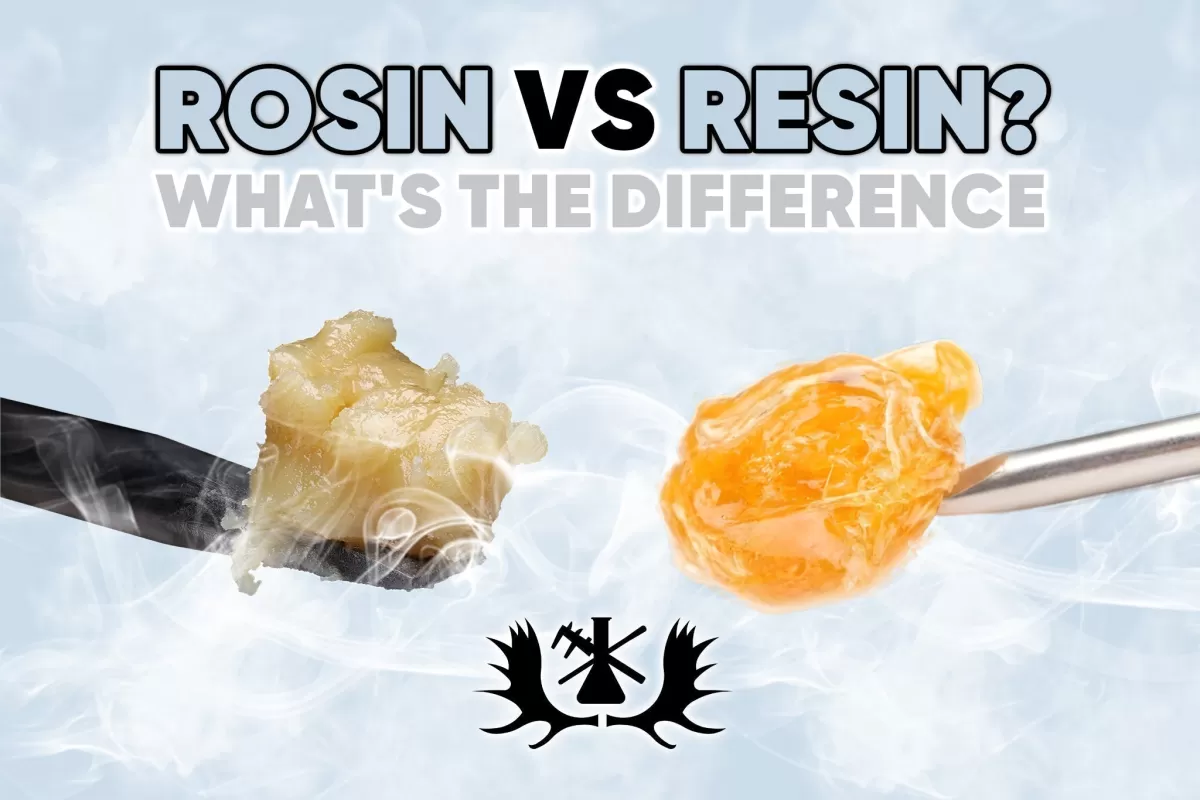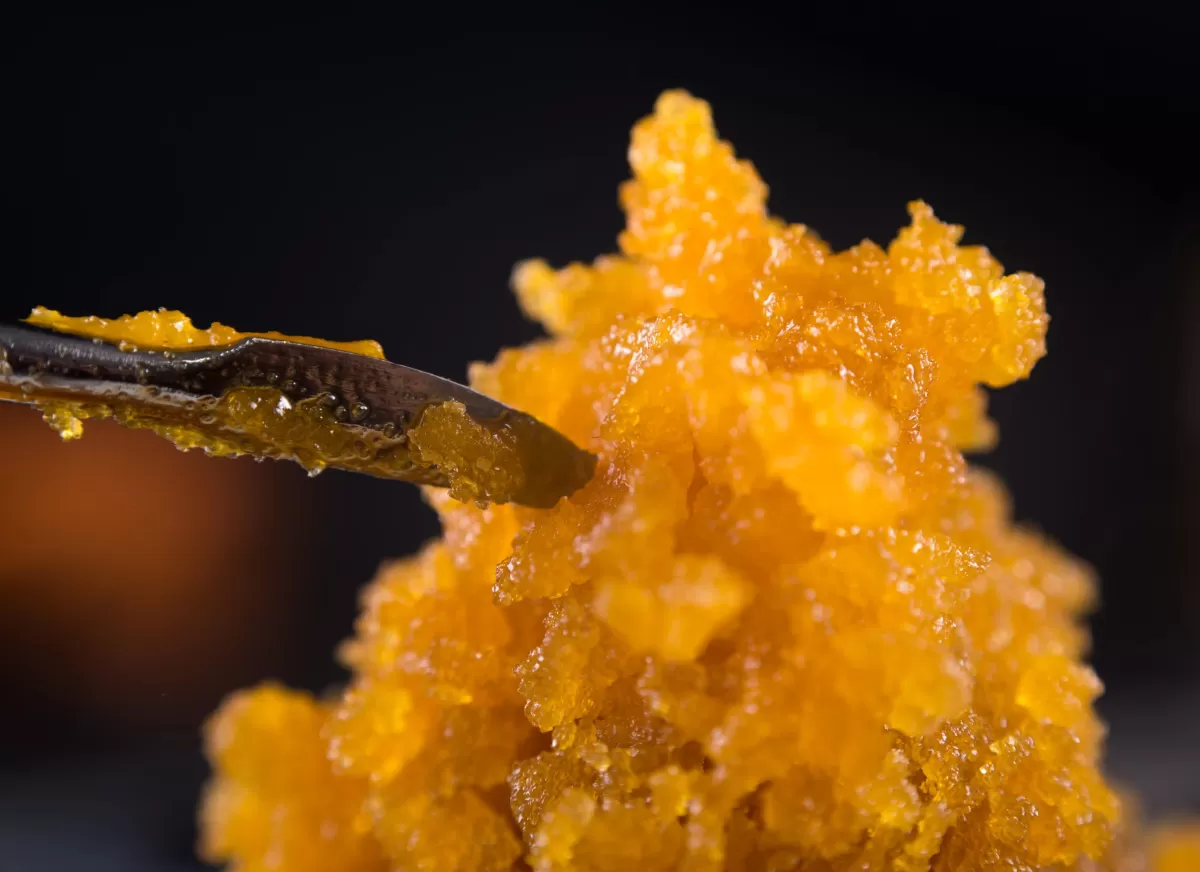What is Resin in Cannabis and Industry
Resin is a natural or synthetic compound widely used in both cannabis products and industrial applications. In cannabis, resin refers to the sticky, terpene-rich substance extracted from the plant’s flowers and trichomes. Industrially, resins are synthetic polymers utilized for adhesives, coatings, and composites.
Types of Resin
-
Live Resin
Made from flash-frozen cannabis that is processed with solvents like butane or propane. Flash freezing preserves the plant’s terpene profile, delivering a full-spectrum extract valued for its rich flavor and potency.
-
Cured Resin
Extracted from dried and cured cannabis flowers. This resin undergoes slower processing and often has a different terpene and cannabinoid profile compared to live resin.
-
Synthetic Resins
These are chemically formulated resins created for industrial use, including adhesives, varnishes, and composite materials. They are not derived from cannabis but share the name due to their sticky and durable properties.
Resin Extraction Process
Most cannabis resins use solvent-based extraction methods such as butane hash oil (BHO) or propane extraction. These solvents dissolve cannabinoids and terpenes from the plant material.
- Purging solvents is critical to ensure consumer safety. Residual solvents can be harmful if not properly removed.
- Modern equipment and techniques help obtain a clean, pure concentrate.
Resin Characteristics
Resin concentrates vary in texture and appearance:
- Saucy: Fluid and sticky with visible terpene-rich sauce.
- Sugary: Crystalline, grainy texture with high potency.
- Waxy: Soft and pliable, easy to handle.
Typical THC potency ranges from 60% to 90%, making resin one of the most potent cannabis concentrates available.
The flavor profile is often rich and complex because live resin preserves more terpenes, the aromatic compounds responsible for strain-specific flavors and effects.
Applications of Resin
-
Cannabis Uses:
Resin is popular for dabbing, vaping, and adding to edibles due to its potency and preserved terpene profiles.
-
Industrial Uses:
Synthetic resins find applications in adhesives, coatings, and composite materials, providing durability and versatility for manufacturing.
Understanding resin’s diverse nature helps consumers and businesses choose the right product whether for high-potency cannabis use or industrial manufacturing needs.
What is Rosin Overview and Types
Rosin is a solventless cannabis concentrate made by applying heat and pressure to cannabis plant material or hash, without the use of chemicals. It’s a natural byproduct both in cannabis and in some industrial applications like adhesives and varnishes.
Types of Rosin Cannabis Concentrates
- Live rosin: Made from flash-frozen cannabis bubble hash, preserving maximum terpene content and flavor.
- Flower rosin: Extracted directly from dried cannabis flower using heat and pressure.
- Hash rosin and kief rosin: Produced from hash or kief starting materials, often yielding different textures and potency.
Rosin Extraction Process Solventless Methods
Rosin is prized for its clean, solvent-free extraction process. It uses heat and pressure to squeeze the resinous sap out of the plant or hash.
- Industrial rosin presses perform this at precise temperatures and pressures.
- Many consumers also use DIY methods with hair straighteners or rosin presses at home.
This method ensures no residual solvents, making it a popular choice for health-conscious users.
Characteristics of Rosin Cannabis Concentrates
- Texture types can range from badder (soft and creamy), shatter (glassy and brittle), to sap-like (sticky and stretchy).
- THC potency typically ranges between 60% to 80%, varying based on the starting material.
- The flavor profile is highly regarded for being pure and strain-specific since it preserves terpene-rich compounds without chemical interference.
Applications of Rosin in Cannabis and Industry
- In cannabis use, rosin is great for dabbing, vaping, and making edibles, especially where solvent-free concentrates are preferred.
- Industrially, rosin serves as a natural adhesive and varnish, valued for its sustainable and non-toxic qualities.
Rosin stands out for those seeking a clean, potent, and flavorful cannabis concentrate without the risks associated with solvents, bridging consumer safety with industrial versatility.
Key Differences Between Resin and Rosin Concentrates
Understanding the differences between resin and rosin is important to pick the right cannabis concentrate for your needs or industrial use. Here’s a clear breakdown:
Extraction Methods
- Resin uses solvent-based extraction, typically with butane or propane. This method pulls out cannabinoids and terpenes efficiently but requires a purging process to remove solvents for safety.
- Rosin is made using solventless extraction with just heat and pressure—no chemicals involved. It’s a cleaner method, often favored by those wanting a more natural product.
Purity and Safety
- Because resin involves solvents, residual solvents can sometimes remain if not properly purged, which raises safety and purity concerns. Testing and quality control are key.
- Rosin’s solventless process generally means higher purity and fewer contaminants, making it safer by default.
Flavor and Terpene Profiles
- Live resin retains more terpenes thanks to flash-freezing before extraction, giving it a strong, rich flavor profile and aromatic experience.
- Rosin also preserves terpenes well, but since it’s heat and pressure-based, some delicate terpenes might degrade, although many users appreciate its pure and strain-specific taste.
Potency and Entourage Effects
- Both concentrates are potent, with THC levels typically in the 70-90% range, but live resin is often noted for a more full-spectrum effect due to the preserved terpene and cannabinoid mix.
- Rosin can match the potency but leans more on clean extraction benefits rather than sheer cannabinoid level. The entourage effect is present but may feel different depending on terpene retention.
Cost and Availability
- Resin production requires expensive equipment and controlled environments because of solvents, but it’s more widely available on the market at often a lower price per gram.
- Rosin equipment like rosin presses is generally less costly and more accessible for DIY users, but rosin products can be pricier due to smaller batches and manual processes.
Ease of Production and Equipment
- Resin extraction is complex, involves solvents, and needs strict safety measures and trained professionals. Industrial scale production requires advanced gear.
- Rosin extraction is simpler and safer, often done with small presses or even DIY setups at home, making it ideal for small-scale or personal use without risk of solvent exposure.
In , resin offers high potency and rich flavor through solvent extraction but brings purity and safety considerations, while rosin delivers a cleaner, natural concentrate with easier production but sometimes slightly less terpene intensity. Your choice depends on what matters most—flavor, purity, cost, or convenience.
Resin vs Rosin Which is Right for You
For Cannabis Consumers
Choosing between live resin and live rosin mostly comes down to what you value in your cannabis concentrates:
- Live Resin
- Offers higher potency and robust flavor thanks to solvent-based extraction preserving terpenes well
- Generally available at a lower cost because of more scalable production
- Ideal if you want intense effects and a rich terpene profile without worrying about solvent residues (which reputable producers minimize through purging)
- Live Rosin
- Perfect if you want a solvent-free, pure concentrate made with just heat and pressure
- Maintains a smooth, strain-specific flavor thanks to solventless methods
- Usually pricier and made in smaller batches, but better for those with health or environmental concerns
- Great choice if you prefer a natural product without solvents or chemicals involved
For Industrial Applications
Different industry needs call for different types of resin and rosin:
- Resin
- Suits high-volume manufacturing like adhesives, coatings, and composites
- Synthetic and natural resins are easier to customize for durability and performance
- More cost-effective at scale
- Rosin
- Used in eco-friendly adhesives, varnishes, and natural product formulations
- Preferred where biodegradability and sustainability matter
- Fits smaller batch production focused on clean, natural raw materials
Key Considerations Before Choosing
When deciding between resin and rosin for cannabis or industrial purposes, keep these factors in mind:
- Budget – Resin is often less expensive and easier to produce at scale; rosin tends to be costlier due to labor and equipment
- Desired Effects – Resin can offer slightly higher THC potency; rosin offers purity without solvents for a cleaner experience
- Extraction Method – Solvent-based resin extraction versus solventless rosin press impacts safety and flavor
- Environmental Impact – Rosin is more eco-friendly with no hazardous solvents
- Health Preferences – If avoiding any solvent traces matters, rosin is the safer option
With these points, you can better match your needs—whether it’s for dabbing, vaping, or industrial use—to the right cannabis concentrate or resin product.
How Blissam Supports Resin and Rosin Applications for Industry
At Blissam, we specialize in providing high-quality resin and rosin compounds tailored to diverse industrial needs, including cannabis concentrates and beyond. Our deep expertise in both solvent-based and solventless extraction materials ensures that businesses get reliable, consistent products that meet strict safety and performance standards.
Expertise in Resin and Rosin Solutions
- Industry-Grade Materials: Whether you need live resin for potent, terpene-rich extracts or rosin for pure, solventless applications, Blissam offers formulations designed for optimal performance.
- Purity and Safety: We prioritize clean processing and rigorous testing to guarantee that our resin and rosin compounds are free from harmful impurities, including residual solvents.
- Sustainability Commitment: Our manufacturing processes focus on eco-friendly practices, helping customers reduce their environmental footprint while maintaining product quality.
Customized Support and Collaboration
Blissam works closely with clients to develop custom resin and rosin solutions that match specific application requirements—whether for dabbing concentrates, vaping products, industrial adhesives, or coatings. Our dedicated technical team provides:
- Product formulation advice
- Customized batch production
- Quality assurance protocols
- Compliance support for U.S. regulatory standards
Contact Blissam for Tailored Resin and Rosin Solutions
If you’re looking for expert partners in manufacturing and supplying industrial resins, cannabis concentrates, or silicone resin blends, reach out to Blissam. Our goal is to provide safe, sustainable, and high-performing materials that power your products and processes efficiently.
For more details on resin applications or to discuss your specific needs, contact us directly and get solutions designed to scale with your business.
Learn more about our high-quality resin products including cured resin and silicone resin options at Blissam.
FAQs About Resin and Rosin Cannabis Concentrates
What is the main difference between resin and rosin
Resin generally refers to cannabis concentrates extracted using solvents like butane or propane. This includes live resin and cured resin, which retain high THC and terpene levels but may contain residual solvents if not properly purged. On the other hand, rosin is made with a solventless process using only heat and pressure, making it a cleaner, safer option for those concerned about solvents.
Strength comparison of live resin vs live rosin
Both live resin and live rosin are known for their high THC potency and rich terpene profiles, but:
- Live resin tends to be slightly stronger in THC due to solvent-based extraction.
- Live rosin offers a purer experience with no residual solvents and often better terpene preservation because it starts from bubble hash or flower that’s flash-frozen.
Can you make rosin at home
Yes, making rosin at home is quite popular among cannabis users because it requires minimal equipment:
- A basic rosin press or even a hair straightener can be used.
- The process involves applying heat and pressure to cannabis flower or hash.
- It’s a safe, solvent-free way to extract concentrated cannabinoids and terpenes.
Are there concerns about residual solvents in live resin
Since live resin is produced using solvents, residual solvents can be a concern if the product isn’t properly purged.
- Reputable manufacturers like Blissam ensure strict quality control and thorough purging to eliminate solvents.
- Always look for lab-tested products confirming solvent levels are within safe limits.
How does Blissam ensure quality in resin and rosin products
Blissam is committed to purity, safety, and consistency in all its resin and rosin compounds. Key quality steps include:
- Using advanced extraction and purification processes to maintain full-spectrum profiles.
- Rigorous testing for potency, terpene content, and contaminants.
- Providing tailored solutions to fit industrial and cannabis concentrate needs across the U.S.
For more on resin extraction and curing, check out what is live resin and cured resin details.


